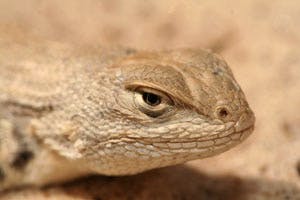WASHINGTON – Defenders of Wildlife issued a new analysis today on the loss of habitat for the dunes sagebrush lizard in West Texas. Using satellite data and cloud computing, Defenders’ Center for Conservation Innovation found nine operations mining sand to use in oil and gas development, some of which are damaging the lizard’s habitat.
Sand mines on the Texas landscape are appearing suddenly and are expanding quickly; 16 sand mines are operating or planning to operate in the West Texas counties of Crane, Ector, Ward and Winkler. According to Defenders’ satellite image analysis, the sand mines disturbed 292 acres of lizard habitat and surrounding buffers between February and August of this year. Based on lease data for the sand mines, eventually over 23,000 acres − nearly 10 percent − of the lizard’s habitat and adjacent buffer zones in Texas could be disturbed or destroyed by the sand mining operations.
Ya-Wei Li, vice president of endangered species conservation and director of the Center for Conservation Innovation for Defenders of Wildlife, said:
"Our analysis of satellite images shows that the rush on frac sand mining in the Permian Basin threatens to push the dunes sagebrush lizard towards extinction. Unfortunately, if the sand mining companies do not refrain from developing in lizard habitat, we might see the extirpation of the Texas populations in the near future.
"Each month, we will publicly distribute the latest satellite images of all the sand mines. If a mining company destroys lizard populations, the whole world will see it unfold."
For over 75 years, Defenders of Wildlife has remained dedicated to protecting all native animals and plants in their natural communities. With a nationwide network of nearly 2.1 million members and supporters, Defenders of Wildlife is a leading advocate for innovative solutions to safeguard our wildlife for generations to come. To learn more, please visit https://defenders.org/newsroom or follow us on X @Defenders.
News

Defenders Calls on Service to Pull Out from Habitat-Degrading Land Swap

